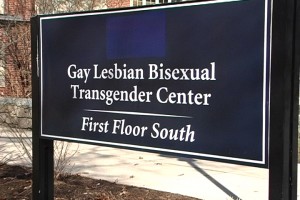An unresponsive university president doesn’t look good
For more than a decade, the University of Rhode Island had a national reputation as one of the most unfriendly campuses for gay, lesbian, bisexual and transgender students. Those students didn’t need The Princeton Review to tell them how hostile the environment had become; they had been living it as the targets of graffiti and homophobic slurs for years.
“There were a lot of people who were very cautious and not out as gay people,’’ said Andrew Winters, an openly gay man, who was hired by URI in 1995, initially to work in residence education, having spent most of his career as an advocate around diversity issues. Winters later established a center for GLBT students on the first floor of Adams Residence Hall, but the climate for gays and minorities had gotten so bad that in 2009, the U.S. Justice Department was called to take a look. It was this environment that greeted David Dooley when he took over as URI’s 11th president in April of 2010. Dooley said one of his Transformational Goals was to have a campus that values and embraces equity and diversity.
Within a year, Winters found himself out of a job. Dooley, in his only public comment told a reporter, “Andrew Winters retired. But he was not forced to retire.’’
Winters and others we’ve interviewed tell a much different story, painting the picture of an administration that wasn’t addressing the concerns of the gay community on campus and grew tired of Winters’ leading the charge for reforms. In June 2011, Winters signed a nine-page separation agreement that included both a payout and a gag order.
In a wide-ranging interview, Winters told us he signed it because he feared being fired and walking away with nothing. He didn’t have a contract or union protection. He is speaking publicly for the first time to The Hummel Report because he has tried unsuccessfully to get the Rhode Island Board of Governors to hear details of what he calls a coerced agreement, signed under duress.
Four months after Dooley arrived as president, a group including Winters and his assistant, Joe Santiago, met at the president’s house to outline their concerns. Winters said nothing changed after the meeting and during fall 2010 he helped a group of students stage what became an 8-day sit-in at the campus library, which was covered by statewide media.
“I know President Dooley was very unhappy with the fact that the university was receiving what he considered to be attention that was negative to the university,’’ Winters said.
Within months the university hired a woman named Kathryn Friedman as a consultant with the title interim vice president for community, equity and diversity. She reported directly to the president.
By then a whisper campaign had begun about what was commonly known as “Andrew’s issues.” The implication was the students didn’t have the same concerns Winters expressed both publicly and privately. Students we talked to who were there at the time said just the opposite.
At first, Winters said, Friedman — who was gay herself — befriended him. “She said, ‘The president and the provost here are trying to keep you out of meetings.’ Frankly she said they were going to come after me,’’ he said. “But she said, ‘Don’t you worry; I’ve got your back.’’’
Friedman wasted no time honing in on Winters. Two months after her arrival, Friedman sent Winters a blistering letter of reprimand saying she met with many people inside and outside the GLBT community and everyone expressed no confidence in him. She said Winters was difficult to work with, divisive and defensive, but offered no supporting evidence.
In fact, Winters received numerous letters of thanks and congratulations for his work on campus, organizing yearly symposiums. He was also recognized by the URI Foundation.
We emailed President Dooley directly asking for an interview and a response to Winters’ claims. Dooley never responded to us, referring our email to a spokeswoman for the university. She told us Dooley would not do an interview, calling this a personnel issue.
Winters’ agreement with the university and its board of governors gave him a $125,000 payment, including $21,000 to help offset healthcare costs for him and his husband who was in his health plan and nearly $27,000 for unused vacation and sick time.
Winters readily acknowledges the agreement provides no avenue for appeal. But he wants the Board of Governors for Higher Education, which ultimately oversees URI, to know he signed under duress and to entertain reconsideration. He sent a detailed letter to Ray DiPasquale, commissioner for higher education at the time. That was two years ago.
Dooley has refused to speak with anyone who has approached him about this case, including lawmakers.
So last month, Representatives Spencer Dickinson and Frank Ferri filed legislation that would form a special commission to investigate issues of fairness in hiring and retention at URI.
Hummel: What do you say to the person who says this is just a disgruntled guy who wants to get back at his employer?’
Winters: I think that’s a standard way to disqualify anybody who’s speaking out against a problem that needs to be addressed.
The Hummel Report is a 501 3C non-profit organization that relies, in part, on your donations. If you have a story idea or want make a donation go to www.hummelreport.org, where you can also see the video version of this story titled “Squeeze Play.” You can also e-mail Jim directly at jim@hummelreport.org.
